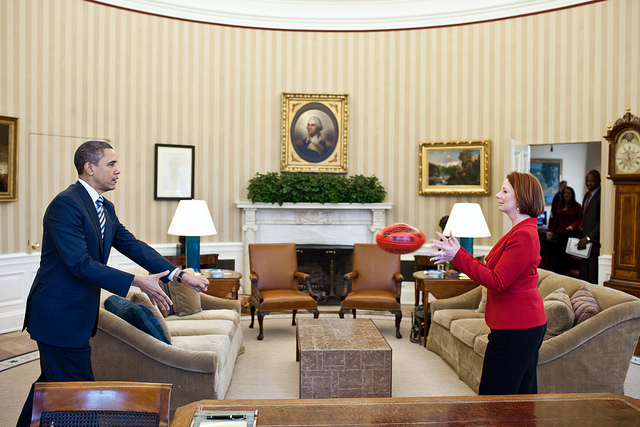
The Prime Minister’s Office will be keen to downplay the significance of last weekend’s phone call between Malcolm Turnbull and US President Donald Trump, but both the call and the fact that it leaked in such detail, are extraordinary and unparalleled in the history of the Australian–American alliance.
According to the report from The Washington Post, Trump’s call with Turnbull came at the end of a long session of calls with leaders from countries including France, Germany and Russia. In a description that’s surely unprecedented in such company, Trump complained to Turnbull that theirs was ‘the worst call by far.’
The crux of their disagreement was allegedly the refugee deal negotiated by Canberra in the dying days of the Obama administration, which has been under a cloud since Trump’s election last November. Branding it the ‘worst deal ever’ Trump complained that he was going to ‘get killed politically’ over it and, at one point, reportedly accused the PM over seeking to export the ‘next Boston bombers.’
The report tells us little about Turnbull’s side of the conversation beyond suggesting that they move on to discuss other issues of pressing importance, at which point the President reportedly moved to end the call. While the status of the deal itself remains unclear, Trump has reportedly stated that it’s his ‘intention’ honour the agreement. Based on that combination of words and subsequent White House statements, that all seems highly uncertain If Trump does honour the deal, he will surely expect a quid pro quo. As counterintuitive as it seems, Turnbull may be better off dropping the deal himself, thus removing Trump’s leverage. Whatever the outcome, it’s clear that involving an issue as politically charged as asylum seekers in our key alliance relationship was ill advised.
What does all this mean for the ANZUS alliance? First, it’s potentially damaging to the way the alliance is perceived here in Australia. Traditionally the Australian public continue their support for ANZUS even when they disapprove of a particular president (George W. Bush, for example) but the latest revelations break new ground; managing the domestic fallout will be challenging. A strong alliance requires public support, which shouldn’t be taken for granted. The ALP have already taken a strong anti-Trump line. It may be that the temptation to morph that into an anti-ANZUS line and to capitalise on the perception of a bullied Prime Minister is too great for the Opposition to pass up.
Second, the call demonstrates two very different approaches from Canberra and Washington. Turnbull, in his public statements and in traditional Canberra style, has appealed to the rich shared history between Australia and the US, as well as the common values of both countries. Trump, on the other hand, is taking a purely transactional approach. A long history of shared exploits on the battlefield cuts little ice with the Donald. ‘What have you done for me lately?’ is his core concern.
The dynamic isn’t unprecedented. The history of the alliance is a history of Australian sentimentalism versus American pragmatism. Robert Menzies discovered that when Jack Kennedy told him to expect no US assistance should he find himself in a war with Indonesia in the early 1960s. John Howard discovered it when he launched his intervention in East Timor with the expectation that US boots on the ground would be forthcoming. However, no Australian leader has received quite this treatment from an American president—not even Whitlam during his infamous feud with Nixon.
This episode is a reminder that Trump’s personal diplomacy—if it can be called “diplomacy”—is of a different ilk. In his Wednesday address to the National Press Club Turnbull attempted to present himself to the electorate as an outsider by claiming that he’s ‘no political animal.’ It now appears that Trump gave him an example of how a real outsider does business. Turnbull, like Trump, is a businessman and it may be that as a businessman he discovers the key to managing his relationship with Trump. And manage it he must. For better or worse, the leader-to-leader relationship is seen as a gauge of the health of the broader alliance. Over 70 years we have seen the relationship prosper under the mutual affection of Holt and Johnston, Howard and Bush and falter under the animosity of Whitlam and Nixon.
Much of this can be superficial—the photo above of Gillard and Obama handpassing a Sherrin footy in the Oval Office comes to mind. The alliance is, in theory at least, bigger than any two leaders. It’s buttressed by agreements and protocols that will last far longer than any political tenure. However, ANZUS has always been dominated by the interaction between the leaders. They set the tone that flows downwards to their respective governments and the interaction between them influences the public’s perception of the alliance, especially here in Australia.
Trump appears to be a president who places more importance on personal relationships than most. He’s as susceptible to charm as he is sensitive to criticism. As many commentators have noted, he has little time for abstract concepts, perhaps not even for the international order under which Australia has done so well. Trump’s concerns are immediate and blatantly self-interested. It’s to that self-interest that Turnbull should appeal, rather than to the more abstract concept of shared values and history.
The weekend’s exchange should be a warning for Canberra that the days of the cheap and easy alliance are over. The future that we’ve been warned about is here. While an alliance in which the US demands more is challenging to Canberra, it’s also an opportunity for us to reassess exactly what we seek from ANZUS and what we’re prepared to invest to secure that.
Early in his legal career, Turnbull represented Kerry Packer, another billionaire businessman noted for his abrasive style. By his own account, the young Turnbull dealt with an often fiery Packer firmly but with a cool head. An older Prime Minister Turnbull well may need to draw on that coolness now.

